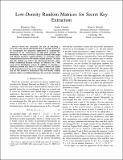| dc.contributor.author | Zhou, Hongchao | |
| dc.contributor.author | Chandar, Venkat B. | |
| dc.contributor.author | Wornell, Gregory W. | |
| dc.date.accessioned | 2014-10-21T17:47:58Z | |
| dc.date.available | 2014-10-21T17:47:58Z | |
| dc.date.issued | 2013-07 | |
| dc.identifier.isbn | 978-1-4799-0446-4 | |
| dc.identifier.issn | 2157-8095 | |
| dc.identifier.uri | http://hdl.handle.net/1721.1/91131 | |
| dc.description.abstract | Secret key extraction, the task of extracting a secret key from shared information that is partially known by an eavesdropper, has important applications in cryptography. Motivated by the requirements of high-speed quantum key distribution, we study secret-key extraction methods with simple and efficient hardware implementations, in particular, linear transformations based on low-density random matrices. We show that this method can achieve the information-theoretic upper bound (conditional Shannon entropy) on efficiency for a wide range of key-distribution systems. In addition, we introduce a numerical method that allows us to tightly estimate the quality of the generated secret key in the regime of finite block length, and use this method to demonstrate that low-density random matrices achieve very high performance for secret key extraction. | en_US |
| dc.description.sponsorship | United States. Air Force Office of Scientific Research (Grant FA9550-11-1-0183) | en_US |
| dc.description.sponsorship | United States. Defense Advanced Research Projects Agency. Information in a Photon (InPho) Program (Contract HR0011-10-C-0159) | en_US |
| dc.language.iso | en_US | |
| dc.publisher | Institute of Electrical and Electronics Engineers (IEEE) | en_US |
| dc.relation.isversionof | http://dx.doi.org/10.1109/ISIT.2013.6620698 | en_US |
| dc.rights | Creative Commons Attribution-Noncommercial-Share Alike | en_US |
| dc.rights.uri | http://creativecommons.org/licenses/by-nc-sa/4.0/ | en_US |
| dc.source | MIT web domain | en_US |
| dc.title | Low-density random matrices for secret key extraction | en_US |
| dc.type | Article | en_US |
| dc.identifier.citation | Zhou, Hongchao, Venkat Chandar, and Gregory Wornell. “Low-Density Random Matrices for Secret Key Extraction.” 2013 IEEE International Symposium on Information Theory (July 2013). | en_US |
| dc.contributor.department | Lincoln Laboratory | en_US |
| dc.contributor.department | Massachusetts Institute of Technology. Department of Electrical Engineering and Computer Science | en_US |
| dc.contributor.department | Massachusetts Institute of Technology. Research Laboratory of Electronics | en_US |
| dc.contributor.mitauthor | Zhou, Hongchao | en_US |
| dc.contributor.mitauthor | Chandar, Venkat B. | en_US |
| dc.contributor.mitauthor | Wornell, Gregory W. | en_US |
| dc.relation.journal | Proceedings of the 2013 IEEE International Symposium on Information Theory | en_US |
| dc.eprint.version | Author's final manuscript | en_US |
| dc.type.uri | http://purl.org/eprint/type/ConferencePaper | en_US |
| eprint.status | http://purl.org/eprint/status/NonPeerReviewed | en_US |
| dspace.orderedauthors | Zhou, Hongchao; Chandar, Venkat; Wornell, Gregory | en_US |
| dc.identifier.orcid | https://orcid.org/0000-0001-9166-4758 | |
| dspace.mitauthor.error | true | |
| mit.license | OPEN_ACCESS_POLICY | en_US |
| mit.metadata.status | Complete | |
